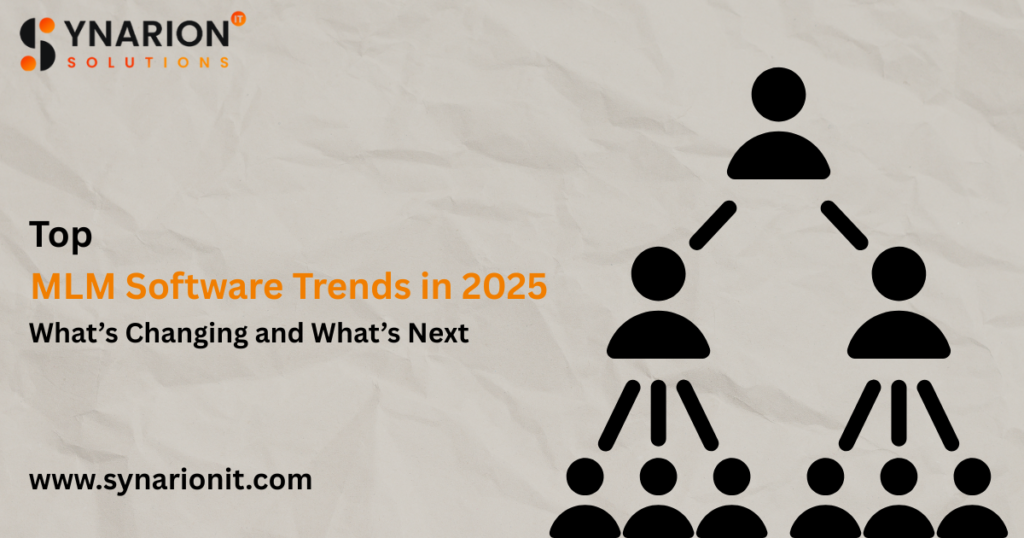Multi-Level Marketing (MLM) is a dynamic industry that continues to evolve rapidly, especially with the integration of cutting-edge technologies. As we step into 2025, MLM businesses are witnessing a technological revolution. From blockchain-based security features to AI-powered analytics, MLM software is becoming smarter, more scalable, and increasingly efficient.
To stay ahead of the competition, MLM companies must stay updated with the latest software trends. More importantly, they need a reliable MLM Software Development Company in India that can deliver customized, scalable, and secure solutions.
In this blog, we’ll explore the major MLM software trends in 2025, what’s changing in the industry, and what MLM businesses should expect next.
1. Blockchain for Enhanced Transparency and Security
One of the most transformative trends in MLM software is the integration of blockchain technology. In 2025, more MLM companies are adopting blockchain to bring transparency, traceability, and decentralization to their platforms.
Why it matters:
- Immutable transaction records prevent manipulation.
- Smart contracts automate commissions and payouts.
- Improved trust among distributors and customers.
2. AI and Machine Learning for Smarter Decision Making
Artificial Intelligence (AI) is no longer futuristic—it’s now at the heart of intelligent MLM systems. AI-powered MLM software in 2025 can analyze vast datasets to deliver predictive insights, identify high-performing distributors, and optimize lead generation strategies.
Key AI applications in MLM software:
- Automated customer support with chatbots.
- Personalized marketing and sales recommendations.
- Fraud detection and risk management.
3. Mobile-First MLM Platforms
With smartphone penetration at an all-time high, MLM companies can no longer afford to ignore mobile-first strategies. Modern MLM software must offer mobile-responsive dashboards, dedicated apps, and real-time notifications for on-the-go access.
What’s trending:
- Android and iOS apps for member management.
- Push notifications for commission updates and new recruits.
- Mobile KYC and digital wallet integration.
4. Cloud-Based MLM Solutions
Cloud computing continues to dominate the MLM software landscape due to its scalability, flexibility, and cost-efficiency. In 2025, most MLM companies prefer cloud-based MLM software to avoid the limitations of traditional, on-premise systems.
Advantages of cloud-based MLM software:
- Real-time data synchronization.
- Scalable infrastructure to handle network growth.
- Reduced IT costs and maintenance.
A skilled MLM Software Development Company in India offers cloud-hosted MLM solutions that support fast deployment, seamless upgrades, and secure access.
5. E-Wallet Integration and Digital Payments
The rise of digital payments and e-wallets has significantly transformed how commissions are distributed in MLM businesses. In 2025, seamless integration of payment gateways and wallets is a must-have feature.
Key developments:
- Real-time commission disbursement to wallets.
- Multi-currency support for global MLM networks.
- UPI, PayPal, Stripe, Razorpay, and crypto payment integration.
6. Gamification and Engagement Tools
Keeping distributors engaged and motivated is a major challenge in MLM. In 2025, gamification elements such as badges, rewards, leaderboards, and achievement tracking are becoming essential in MLM platforms.
Why gamification works:
- Boosts distributor performance and retention.
- Encourages healthy competition.
- Makes training and onboarding more interactive.
7. Multi-Country and Multi-Language Support
As MLM businesses expand globally, their software must support multiple languages, currencies, and tax systems. In 2025, this is no longer optional—it’s a baseline requirement for software scalability.
Trending features:
- Geo-based content and localization.
- Country-specific compliance modules.
- Role-based access for global teams.
Choosing the right MLM Software Development Services ensures your platform is ready for international markets, enabling smoother onboarding of global distributors.
8. Advanced Analytics and Business Intelligence
The use of advanced analytics is redefining how MLM leaders make decisions. From tracking KPIs to forecasting earnings, data is the new oil for MLM success in 2025.
Analytics features in demand:
- Real-time dashboards and visual reports.
- Network growth projections and churn analysis.
- Customizable performance metrics.
With the support of a professional MLM Software Development Company in India, businesses can integrate BI tools that transform data into actionable insights.
9. Robust Admin Controls and Compliance Modules
Regulatory scrutiny on MLM models continues to increase. As a result, compliance-focused features are a major trend in 2025. Admins need greater control, visibility, and automation to ensure the business adheres to laws and internal policies.
Compliance capabilities:
- Automated tax calculations (GST, VAT, etc.).
- Role-based access control and audit logs.
- KYC/AML modules for onboarding.
10. Integration with Marketing and CRM Tools
Marketing automation is now deeply embedded in MLM software ecosystems. Businesses are integrating CRM systems, email marketing platforms, and lead generation tools to boost distributor productivity.
Top integrations:
- Salesforce, Zoho, HubSpot for CRM.
- Mailchimp, Sendinblue for email campaigns.
- Facebook and Google Ads for lead generation.
A reputed MLM Software Development Company in India offers seamless integrations with third-party tools to supercharge marketing and customer engagement efforts.
What’s Next for MLM Software?
Looking beyond 2025, here are some innovations on the horizon:
- Metaverse MLM Platforms: Virtual networking and training in immersive environments.
- Voice Assistant Integration: Using AI-powered voice commands to navigate dashboards.
- Decentralized Autonomous MLM Organizations (DAOs): Community-driven governance through smart contracts.
Final Thoughts
As the MLM industry continues to grow, so does the demand for smarter, more secure, and scalable software solutions. The trends in 2025 emphasize mobile-first experiences, blockchain transparency, AI intelligence, and global expansion support.
Whether you’re launching a new MLM business or scaling an existing one, investing in innovative software is crucial. Collaborating with a trusted provider of MLM Software Development Services ensures your business is equipped with the right tools to thrive in the digital age.
If you’re looking to future-proof your MLM operations, now is the time to consult an expert MLM Software Development Company in India to guide you through the transformation.



